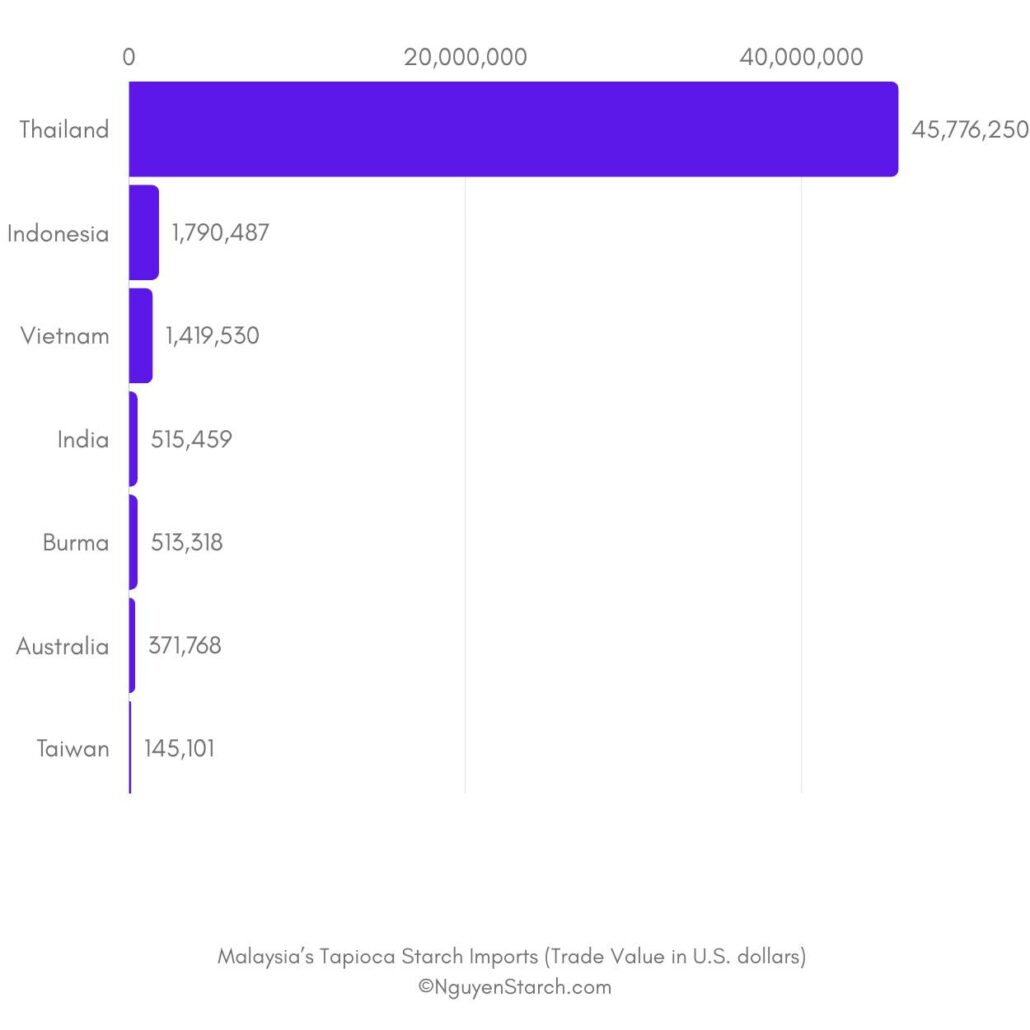Malaysia’s involvement in the tapioca starch trade is notable, both as an exporter and an importer. As an exporter, Malaysia ranks favorably among global competitors, with significant export volumes directed to the United Kingdom, Singapore, and other key markets. Concurrently, Malaysia’s import volumes for tapioca starch are substantial, primarily driven by imports from Thailand, Indonesia, and Vietnam.
Exports
In 2021, Malaysia showcased its prominence in the global market by exporting $407k worth of tapioca starch, securing the 25th spot among the largest exporters of this product worldwide. Tapioca starch, though ranking as the 3005th most exported product in Malaysia, demonstrated its growing significance within the country’s export portfolio.
The primary destinations for Malaysia’s tapioca starch exports were the United Kingdom, which accounted for imports valued at $217k, followed by Singapore ($175k), Brunei ($9.18k), Australia ($4.13k), and France ($1.21k). Notably, between 2020 and 2021, the United Kingdom experienced substantial growth as an export market, with an increase of $217k. Brunei and France also witnessed noteworthy expansion, growing by $3.88k and $915, respectively.
| Continent | Country | Trade Value |
| Asia | Brunei | 9,176 |
| Asia | South Korea | 5 |
| Asia | Singapore | 175,256 |
| Asia | Thailand | 24 |
| Europe | France | 1,211 |
| Europe | United Kingdom | 216,976 |
| Europe | Ireland | 48 |
| North America | Canada | 75 |
| Oceania | Australia | 4,131 |
| Oceania | New Zealand | 184 |
Imports
In 2021, Malaysia emerged as a significant importer of tapioca starch, with imports totaling $50.6M, thereby ranking as the 5th largest importer of this product globally. Tapioca starch stood as the 659th most imported product in Malaysia, highlighting the considerable import volumes engaged by the country. Malaysia primarily sourced tapioca starch from Thailand, with imports amounting to $45.8M. Indonesia followed with imports valued at $1.79M, while Vietnam accounted for $1.42M worth of imports. Additionally, Malaysia imported smaller quantities from India ($515k) and Burma ($513k).

Between 2020 and 2021, Malaysia witnessed remarkable growth in its import markets for tapioca starch. Import volumes from Thailand exhibited a substantial increase of $11.2M, emphasizing Malaysia’s reliance on this key supplier. Import volumes from India also experienced notable growth, rising by $473k, while imports from Australia increased by $159k.
| Continent | Country | Trade Value |
| Asia | China | 9,164 |
| Asia | Indonesia | 1,790,487 |
| Asia | India | 515,459 |
| Asia | Japan | 2,178 |
| Asia | Burma | 513,318 |
| Asia | Singapore | 40,898 |
| Asia | Thailand | 45,776,250 |
| Asia | Vietnam | 1,419,530 |
| Asia | Chinese Taipei | 145,101 |
| Europe | Italy | 22,232 |
| Oceania | Australia | 371,768 |
| South America | Brazil | 4,196 |
Importing Tapioca Starch from Vietnam: A Reliable Partnership
Vietnam has emerged as a prominent supplier of tapioca starch to the Malaysia market. In 2021, the total value of tapioca starch imports from Vietnam amounted to an impressive $1,419,530. This significant figure indicates that Vietnam’s tapioca starch holds a strong position in the market and is poised to maintain its presence in Malaysia in the years to come. The reasons behind this sustained importation are primarily attributed to the product’s superior quality and competitive pricing.
Malaysia benefits from Vietnam’s tapioca starch exports, which provide a dependable supply of this vital ingredient. The substantial import value from Vietnam underscores Malaysia’s confidence in Vietnam as a trusted and preferred partner for fulfilling its tapioca starch requirements. With its consistent quality and competitive pricing, Vietnam’s tapioca starch has proven to be a reliable source that meets Malaysia’s demand for this essential product.
Source: BACI and General Statistics Office of Vietnam
